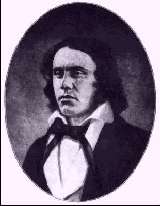
Born: 1815, in Cambridge, Massachusetts, United States
Died: January 6, 1882, in Rome, Italy
Richard Henry Dana was the namesake of his father who was a critic and editor. Dana began studies at Harvard University but was forced to withdraw from studies as the result of an eye affliction. Upon leaving school he found work aboard a sailing ship.
Work on the ship, the Pilgrim, took him on a two year voyage around the Cape Horn to California and Oregon. When he returned, he recounted the story in his book Two Years Before the Mast, published in 1840. His account of the conditions aboard the ship were so vivid and accurate that they motivated legislators to address issues to improve the working conditions of seamen. In addition, his work went on to further influence other maritime writers.
In 1841, he published The Seaman's Friend. It described the rights and responsibilities of a sailor and included a section on Maritime law. This handbook was highly regarded in both America and England and was the standard against which any subsequent handbook was judged.
Dana eventually returned to Harvard, finished his degree and entered law school. After graduation, he began a practice specializing in Maritime law. In 1866, Dana wrote a commentary on Henry Wheaton's International Law and published them together. A previous editor of the work filed suit against Dana for plagiarism. These allegations of plagiarism would cost him the political appointment of U.S. minister to Great Britain in 1876.
Throughout his life, Dana had been active in politics. He was an early member of the Republican Party and was appointed to the office of the district attorney for Massachusetts by President Lincoln in 1860. From 1867 to 1868, he was a member of the Massachusetts legislature but retired in 1879. He spent the remainder of his life traveling and writing.